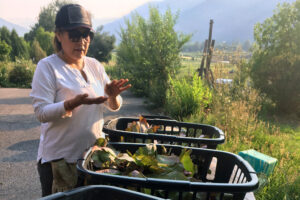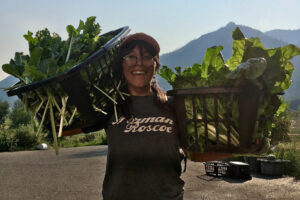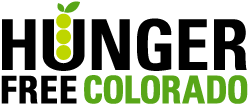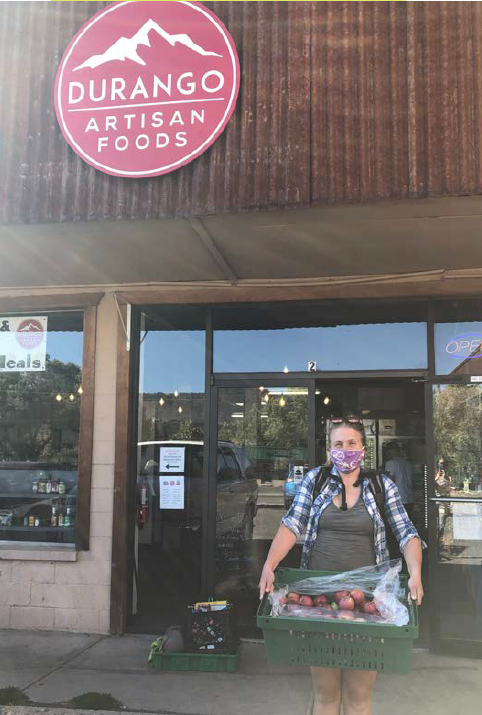Our team of five regional food coordinators works across Colorado to develop local food systems centered around equity. They accomplish this work by placing producers and food access organizations at the nexus of solutions. Check out our Q&A with Rachel Landis, director of The Good Food Collective and one of our regional
food coordinators, below.
What got you interested in this work?
There’re all these different levels to it for me. I come to things from a systems and sustainability-based background. I think about how tax systems can raise all boats,
if you will. And this balancing act between the environment, social justice, and the economy within that. Rather than just shoving your finger in a hole in the dam, you’re also looking at this big, broad landscape of possibilities.
“[This work] is a powerful tool for fighting for equality and justice across all sectors.”
– Rachel Landis
It’s quite apparent that there is food injustice. The implications of that are so profound that you can actually see it. Talk to people and just experience that moment of not having enough food or being forced to eat things that don’t align with what you believe, how you identify, or your culture. That exacerbates this sense of not belonging in addition to not having enough food.
What keeps you in justice work?
When COVID-19 hit, I had a conversation with a woman. She said she didn’t know how she was going to get food, so she just threw a bunch of seats out in the yard with the hope that something would grow. That’s the level of desperation. That’s a pretty rough place to be. All people deserve dignity and health. People are still hungry and farmers are still living near the poverty line.
But the people I work with are incredible and diverse. And in the end, we’re fighting for something that I believe most of us can get behind.
Every single food assistance provider you work with, they can make it happen, period. They don’t care. They’ll find the funding. They will make a program work. It’s going to happen because they know this is a need.

Trish Yazzie, a staff member at The Good Food Collective, embraces the rising sun as she cleans lettuce from Calloused Palms Farm. The lettuce is destined for local food pantries as part of The Good Food Collective’s Farms to Food Assistance Program efforts.
What do you think of the regional food coordinator positions and the Colorado Food Pantry Assistance Grant Program?
This particular opportunity really excites me because The Good Food Collective has been working to connect food providers with wholesale, locally purchased produce for quite a while (before this particular position came about).
Our average farmer earns around $29,000 here. The poverty wage in this area is $55,000 (if you have any family at all). We want to give our farmers an additional end market that supports their well-being, not just monetarily but in their souls. They want to serve the community; they don’t just want to sell to
the wealthy.
I believe in the power of a network and a collective. We need to align the work of all of these incredible stakeholders in every aspect of our system and think of ourselves as a collective entity. This way, we can figure out the opportunities to collaborate for the biggest impact in our community and find where there are gaps and who can tackle them.
For me, any chance we get to connect the dots is a really exciting space to create broader impact and social change. And it provides residents in the community with the healthy, dignified food that they deserve. Being a part of that is pretty awesome.
What are some of the successes you’ve seen as a regional food coordinator?
Oh, man, so many. Nine food pantries got a total of forty-eight thousand dollars in local purchasing funds this last year. I know of at least two hundred and forty-eight thousand dollars that our local food assistance providers brought forward, all of which they dedicated to local procurement.
I think we’ve also built an entire system. Now we have five counties worth of food providers that communicate regularly. And we’ve also built a distribution network. That’s a ton of money circulating in our local economy, a ton of local food that’s going in bellies, and of a ton of small enterprises and businesses that are getting supported. We have an opportunity to do this in a way that supports long-standing food security,
food sovereignty, food resilience, and starts to break down the need for an emergency hunger relief system.

Marissa Hunt, a staff member at The Good Food Collective, shows off the fruits of her labor. These beautiful beets are destined for Manna Soup Kitchen’s weekly food boxes.
What’s The Good Food Collective up to?
For us here at The Good Food Collective, this is just one of the many ties into our food systems, food security, and food equity work. We’ve really embraced the mission of how we get local, healthy, and dignified food into the hands of all our neighbors.
We’ve also got this amazing produce prescription partnership here with our healthcare systems.
On one hand, it’s a direct service program but on the backend, the entire healthcare system has changed the way it operates. It now screens for food insecurity and has started building referral programs. When people go in for a doctor’s visit, it’s not just, “Here are your meds.” They’re going, “Part of the reason you’re here is because of diet. Here are some tools and resources to help you.”
We also have this incredible health equity and food systems coalition that is breaking down the biggest barriers we have when it comes to equitable access to the food system. And honestly, it’s like staring down the face of power imbalance.
Right now we’re a food systems group, but we host a community voice and power-building workgroup for BIPOC community members, led by BIPOC members of our community. We also have an allied development workgroup for power holders in our
food system.
I can’t underscore enough how awesome it is that we’re able to not just help in places where the acute need is out there but also that the community supports us being here to really tackle the root causes.
Learn more about Hunger Free Colorado and our partnership opportunities, here.

